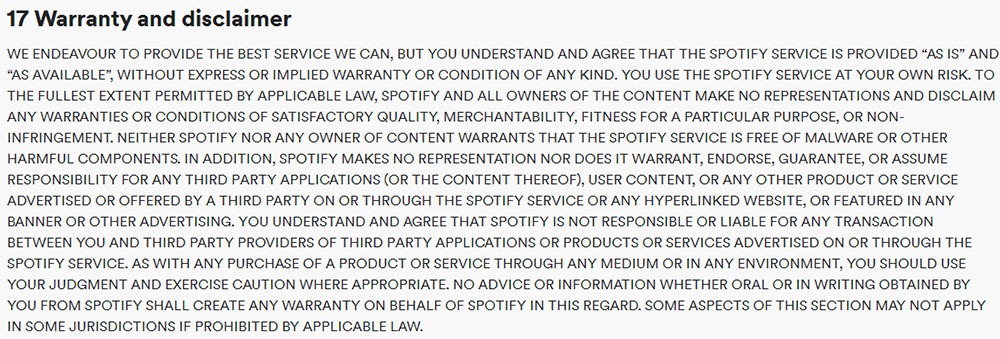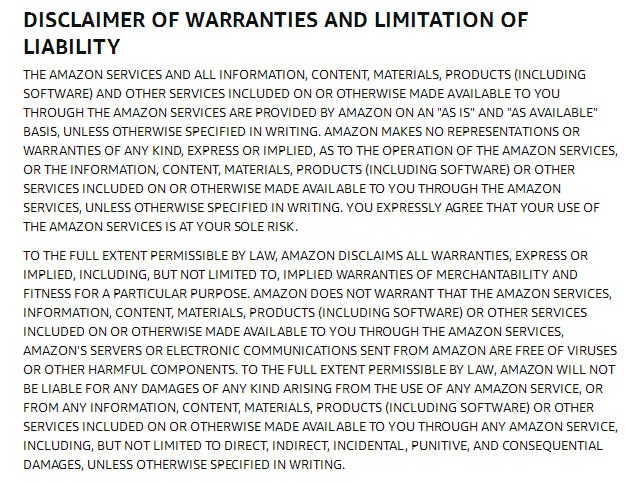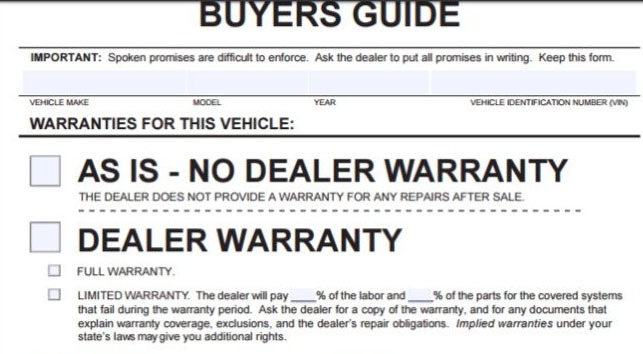Warranty Disclaimers
You see warranties mentioned just about everywhere, from the dealer where you bought your car, to the electronics store where you bought your TV, to that cheesy late-night infomercial you always see when you can't sleep at 4:00 AM.

But do you know how warranties are actually used in the business world? Do you know what a warranty disclaimer is? And, more importantly, do you know if you need to use one?
Let's start with the basics...
A warranty is a written guarantee that's given to a buyer either before or as soon as he completes his purchase. The guarantee spells out what kind of repairs and/or replacements the seller will take care of during a specific period of time.
For example, if you have a three-year warranty from the manufacturer that covers the air conditioner in your car and the air conditioner stops working two years after you first drove off the lot, the manufacturer will make all of the necessary repairs, free of charge. If the air conditioner can't be repaired, it will be replaced.
Now let's talk about warranty disclaimers
These disclaimers are the other side of the coin, so to speak, from a warranty. That's because a warranty disclaimer does the exact opposite of a warranty. Instead of making certain promises to the buyer, a warranty disclaimer is a written statement that says the seller isn't bound by certain guarantees or promises about the product.
Let's go back to our car example. If your car came with a warranty disclaimer and the air conditioner suddenly stopped working, it would be solely your problem. You'd have to pay for the necessary repairs and/or replacement all by yourself.
One important thing to remember -- a warranty disclaimer is NOT the same as breaching a warranty. If your car came with that three-year warranty we talked about and the manufacturer refuses to fix your air conditioner, the manufacturer has just breached the warranty. But if your manufacturer said all along that there was no warranty in place, it would be giving you a disclaimer.
Unlike a breach, a warranty disclaimer is part of the sales agreement from the very beginning. When a buyer signs on the dotted line, he'll know if there's a warranty disclaimer in place. In most cases, you can spot a warranty disclaimer by looking for the words "as is" or "as available."
Want to see a warranty disclaimer in action?
One place where these disclaimers tend to pop up is on websites. Specifically, many websites will include a warranty disclaimer as part of their Terms and Conditions.
Take a look at Spotify's Terms and Conditions. Technically, they're calling this section "Warranty and Disclaimer," but it's the same thing we've been talking about. If you look closely, you'll see that Spotify uses both "as is" and "as available" in their language:

So what does all of this mean?
Simply put, you're using Spotify at your own risk. For example, if you click on an ad that's displayed on Spotify and make a purchase, Spotify isn't responsible for what happens next. If you end up dissatisfied with the purchase or have a dispute with the seller, you can't hold Spotify responsible for any of it.
Here's another example from Amazon. Again, you'll see that "as is" and "as available" are both in there:

Amazon even takes it one step further by specifically listing all of the different types of warranties it's disclaiming.
After looking at these examples, you're probably wondering, "What's with all of the capital letters?"
We're going to talk about laws more in-depth later, but there's no law in place that requires you to type out your warranty disclaimer in all caps. However, the businesses that do it have a very good reason -- they want to make the disclaimer as conspicuous as possible.
Thanks to a statute included in the U.S. Uniform Commercial Code (UCC), the word "conspicuous" is important. Specifically, the law states:
"...to exclude or modify the implied warranty of merchantability or any part of it the language must mention merchantability and in case of a writing must be conspicuous, and to exclude or modify any implied warranty of fitness the exclusion must be by a writing and conspicuous."
By having all caps, a reader will be unlikely to miss this part of the fine print, even if he's just casually scanning the document.
Do you need a Warranty Disclaimer?
The answer may depend on where you live.
If you live in the US, you're required to follow the UCC that we just mentioned. This is the body of laws that governs commercial transactions. The word "Uniform" is very important. This body of laws was created in order to prevent sellers from being completely confused by different laws in different states.
For example, if you live in Michigan, you may be familiar with all of the commercial transaction laws there. But if it wasn't for the UCC, if you sold a product to someone in New Hampshire, there could have been completely different laws there that you may have accidentally broken.
Each state gets to decide if it will adopt the UCC, and as of 2018, all 50 states, the District of Columbia, and all of the US territories have adopted it. That means if you sell anything in the US, you have to abide by everything listed in the Uniform Commercial code.
What happens if you violate the UCC?
The buyer may choose to sue you. Plus, the Federal Trade Commission (FTC) has the authority to take action against you. If the FTC believes that you are committing fraud, they can take civil action -- like forcing you to pay restitution -- or they can charge you with a crime. The FTC has a Criminal Liaison Unit that was created to help prosecutors bring more criminal consumer fraud cases.
Additionally, US sellers are required to follow the Magnuson-Moss Warranty Act. Also under the jurisdiction of the FTC, this law requires sellers of physical goods to provide detailed written information about their warranty coverage.
First, you must list your warranty as either "Full" or "Limited." That means you'll either pay the full repair/replacement cost, or you'll pay for a portion of the repair/replacement up to a certain limit.
Here's an example of what that can look like in your sales agreement:

You must make the terms of your warranty clear and include all of them in a single document, and you must make your warranties available where your products are sold so that consumers can look at them before making a purchase.
However, this law DOES NOT require sellers to offer a warranty. But if you choose to forego a warranty disclaimer, your warranty will have to be written with this law in mind.
In the UK, the Consumer Rights Act of 2015 includes a section about "Goods under guarantee." If you're going to include any kind of guarantee when you make a sale, you're bound by the terms of this law.
In this context, the word "guarantee" is basically the same as the word "warranty" in the US.
Specifically, it means that the seller has made a promise to the buyer that if the goods purchased don't meet the quality of the goods advertised -- or if the goods don't meet the quality described in the written guarantee -- the buyer will either receive a refund, or the seller will make any necessary repairs or replacements.
Furthermore, the law says that the seller has to make all of the terms in the guarantee in "plain and intelligible language." In other words, the average buyer needs to actually understand what the guarantee covers. Plus, the guarantee also has to clearly spell out the terms under which the buyer can make a claim.
If a seller is accused of violating the terms of his guarantee, the punishment varies. In Scotland, the Court of Session can impose terms on the seller that it finds to be reasonable. In England, Wales, or Northern Ireland, the High Court can grant an injunction.
Sellers who violate the Consumer Rights Act of 2015 can also face action from the Competition and Markets Authority, The Department of Enterprise, Trade and Investment, or the local weights and measures authority.
In Canada, warranties fall under the jurisdiction of the Competition Bureau. If you're accused of warranty misconduct that violates the Competition Act -- like not providing the proper warranty disclaimers during the sale process -- you could face a fine up to $750,000 for your first occurrence as an individual. If you run a corporation that has not adhered to warranty law, you could face a fine up to $10 million. If you're fined a second time, those limits jump to $1 million for individuals and $15 million for corporations.
In addition to the Competition Act, there may also be provincial or territorial provisions that apply, depending on where you live.
In Australia, If you sell products or services you don't have the option of typing out a warranty disclaimer and calling it a day. That's because the Australian Consumer Law (ACL) requires businesses to give consumers a guarantee for the products and services they sell. If the product doesn't meet all of the guarantees, the seller is required by law to repair, replace, or refund the purchase. These guarantees are in place regardless of whatever warranty that the seller has listed.
In Australia, there are three different types of warranties that businesses can offer on top of the legally-mandated consumer guarantees:
- Express Warranties, which are extra promises about the quality of the good being sold
- Warranties Against Defects, which are the promises a seller makes in case something goes wrong
- Extended Warranties, which are extensions that cover the buyer for even longer
Whether you offer additional warranties or simply stick to the mandated guarantees, if a buyer accuses you of not following the law, you can face consequences from the Australian Competition and Consumer Commission (ACCC). Or, the buyer can take you to local small claims tribunal or magistrates court.
The biggest exception to these consumer guideline laws are products or services that cost more than $40,000. In some cases, if a buyer makes a purchase at an auction, at a private garage sale, invests in transportation or storage of business goods, or receives services from a professional architect or engineer, there can be exceptions to the guarantees.
Do you need to hire a lawyer to write a Warranty Disclaimer for you?
Not necessarily.
If it would make you feel more comfortable to hire a lawyer to draw up a warranty disclaimer contract that covers all of your legal responsibilities, go ahead and do so. However, there are valuable tools online that can help you create your own warranty disclaimer.
If you need a warranty disclaimer -- either online or off -- but you don't know how to word it, there are samples that you can use.
Still not sure if you need a warranty disclaimer? This may convince you.
A solid warranty disclaimer can ensure that you're on the same page as your customers.
For example, if you have an ad that says you're the best marketing expert in town and can double your clients' revenue, a warranty disclaimer makes that claim easier to understand. While you may have doubled revenue for several of your clients, not ALL of your clients have seen their revenue double. Your warranty disclaimer can limit your legal liability if your client gets angry because his revenue didn't double after he hired you.
The best place to put these kinds of warranty disclaimers in place is in your client contract. By making it a standard part of taking on new clients, you don't have to worry about any confusion later.
Just don't use your warranty disclaimer as an excuse to do poor work or sell poor products! Just because you're not legally liable for what happens next, your customers are counting on you to provide quality. If you don't provide it, you may end up with a good warranty disclaimer but no customers.